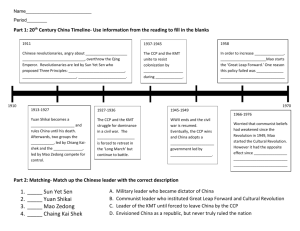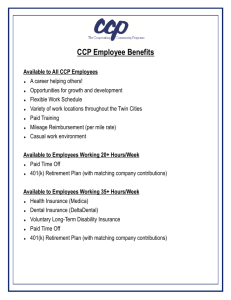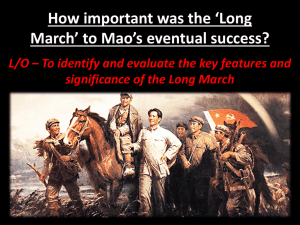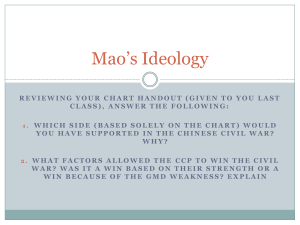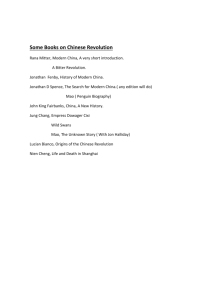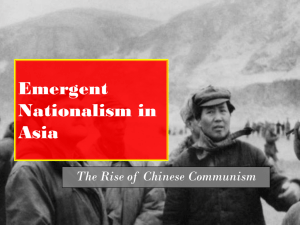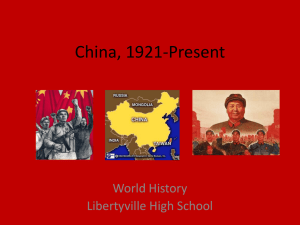China 1910-Present - Fredericksburg City Public Schools
advertisement
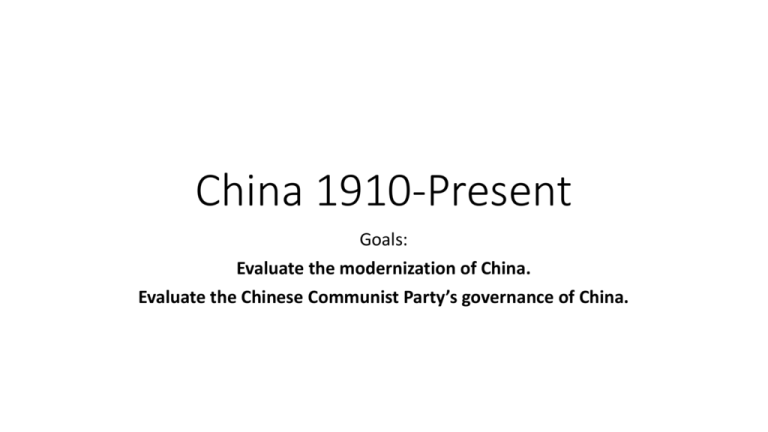
China 1910-Present Goals: Evaluate the modernization of China. Evaluate the Chinese Communist Party’s governance of China. “Century of Humiliation”- 1840’s- 1940’s • Opium Wars & foreign concessions • Christian proselytizing; clash w/traditional faiths • Taiping Rebellion • First Sino- Japanese War (1890’s) • Boxer Rebellion ****Shows Qing Dynasty is falling apart, foreigners are taking advantage of China 1911- 4,000 Years of Dynastic Government Ends • Last Qing Emperor (Puyi) abdicates • “Republic” set up by Chinese nationalist Sun Yat-sen (educated by and baptized by American missionaries and lived in modernizing Japan) • Founds Kuomintang/Guomindang (KMT/GMD) Party based on “Three Principles of the People (basically western-style social democracy) :” 1. 2. 3. Nationalism People’s rights (i.e. democracy) People’s livelihood (proto-socialism, economic security…food, jobs, edu, etc.) Woes in the New Republic- 1910’s- 1920’s • Popular protests & “revolutions” against foreigners • Internal division and rival warlords (most notably Yuan Shikai) carved up China and civil war erupted Major Places to know: Beijing, Shanghai, Nanjing, Taiwan, Tibet, Xinjiang Profile: Chiang Kai-shek (called Jiang Jieshi in SOL speak) • Lesser KMT official, but controlled military. President of China 19271949 (1975 in Taiwan) • Established a military school in the more prosperous and progressive Shanghai region • Built a base of power, decent army, and reconquered most of China (“Northern Expedition”) by 1926 • Kuomintang becomes ruling party of China…no elections though • • • • • • More conservative- promoted traditional values Rejected western-styled democratic socialism of Sun Terribly corrupt Stagnant economy despite reforms Supported by Western powers (notably USA) Capital established at Nanjing (Nanking) Chiang Kai-shek • Also, proof that the more doo-dads you wear, the more of a douche you are…. Profile: Mao Zhedong • Son of a (relatively wealthy) peasant from Hunan province • Inferiority complex? • Became a defunct intellectual in Beijing in the tumultuous 1910’s. Studied western philosophy & economics, eventually influenced by October Revolution in Russia & Vladimir Lenin • Joined/Founded Chinese Communist Party in 1921/22 in…Shanghai (French concession) • Eventually, Mao & other CCP Marxist-Leninist thinkers created a new revolutionary ideology: Marxism-Leninism-Maoism • Marxism-communism is ultimate form of social organization, requires class struggle/war of proletariat (workers) against bourgeoisie (owners of means of production) • Leninism- the proletariat needs a “vanguard;” a party to educate the workers and lead the revolution • Maoism-….we don’t have any workers in China….we have peasants though. So, let’s have an agrarian, peasant (proletariat) based revolution. Bourgeoisie=land-owners. • Concept of “continuous revolution” added later on (first articulated by Trotsky). Mao began to fear “counter-revolutionary,” “conservative,” backlash and retrenchment (basically feared “Thermodorian Reaction.”) Prevent Thermodor by launching a continuous revolution… Is this possible? Chairman Mao (“The Great Helmsman”) Civil War 1927-1937 • At first KMT & CCP cooperated in a united front (this was Russian Bolshevik’s model). • In 1927, Chiang, fresh off Northern Expedition victories, turned on CCP and led a purge of CCP in the KMT, first in Shanghai, then throughout the country • Between 1927-1935, the CCP fought a (mostly losing) war against the KMT • Attempts at sparking peasant uprisings (failed) • “The Long March” • Mao & CCP emerged battle-tested, and strong Chinese Civil War Japanese Invasion, WWII in China • Japanese invaded Manchuria (northern China) in 1935-37, KMT powerless • Japanese pressed their advantage and by 1940’s, conquered most of coastal and central China • Set up puppet gov’t in “Manchuko” (Northern China) under ol’ Puyi (Qing Emperor) • Lots of Japanese atrocities. e.g. “Rape of Nanking” and “Unit 731” • Still contentious today, Japanese have never fully apologized, basically just said “My Bad” • On the surface, KMT & CCP cooperated to fight the Japanese…but Chiang: “The Japanese are a cancer of the skin, the Communist are a cancer of the heart” • CCP gained upper hand during WWII because: 1. 2. 3. 4. They fought the Japanese, not other Chinese KMT was corrupt & inept, KMT troops fled Japanese CCP troops gained respect and loyalty of peasants by paying for housing, food, etc. More practically, the KMT was worn down by decades of conflict and the Japanese successes proved what everyone already knew: the KMT was inept • Flowers of war scene? John Rabe scene? Chinese Civil War (again…) 1945-49 • KMT super weak, discredited….CCP wins, takes over (1949) • KMT flees to Taiwan, sets up Republic of China under Chiang Kaishek & son dictatorship…Taiwan had UN Sec Council seat til ‘72 • Taiwan modernizes, eventually holds elections, and has democracy, today (“Asian Tiger”) • China claims Taiwan as part of China • USA is kinda, sorta tied to Taiwan’s defense by the Taiwan Relations Act of 1979 (US does not have diplomatic relations w/Taiwan…but we do….AND is required to provide defensive military weapons in the event of a Chinese attack Great Leap Forward (2nd Five Year Plan) • Mao’s first Five Year Plan to grow the economy did not….work • So, a super ambitious 2nd Five Year Plan was launched 1958-1962...it become known as the Great Leap Forward • The idea: Sell China’s only real export good (agricultural products) to pay for development of industry (the hallmark of development…also, proletariat envy?) • Industrialization would trickle into agricultural sector, boosting production, hence exports, hence $$$ to reinvest into industry • So, basically trying to grow agriculture & industry at the same time • The problem: Through mismanagement, agricultural production plummeted. Food was still sold abroad, leaving peasants without enough to feed themselves. 50 million+ starved in 3 years. • Less tragically, industrial output also suffered, industrial growth actually declined as a result of hair-brained ideas like “backyard” furnaces, where peasants were encouraged to make steel using recycled metal. That steal was useless. Worse, they melted down their farm tools to make it… • How did this happen? • • • • • Faith in and desire to please Mao (and lying to please him) Faith in peasants & human spirit (and lying about their production) Collectivization removed incentive to produce Good old fashion mismanagement, e.g. train schedules got jacked up so wheat rotted in boxcars No naysayers….those are counter-revolutionaries! (In a democracy, we call it trouble-shooting) The Great Proletariat Cultural Revolution (“The Cultural Revolution”) • In a democracy, after a disaster like the GLF there would be criticism of the gov’t. • So Mao launched the “100 Flowers Movement…” to allow people to criticize how things had gone wrong But… Cultural Revolution 1965-1976 • He used this period of opening to identify opponents. Many party leaders jailed (Zhou Enlai and Deng Xiaoping, for example) • Ya’ see, the problem is Mao was so tied to the Great Leap Forward, that criticizing it, was like criticizing Chairman Mao…and that can’t happen with a cult of personality • So Mao encouraged his “Red Guards” to openly denounce, humiliate, arrest, and beat any “counter-revolutionaries,” “reactionaries,” “Capitalist roaders,” and/or “Foreign sympathizers.” • 100,000’s arrested, beaten, killed. Children were encouraged to denounce elders, parents, teachers, etc. Workers denounced their bosses, party leaders were targeted. No one was safe. • Attempt to erase Confucian heritage, btw. • “Continuous Revolution;” but its exhausting for a society to live in constant fear. Chairman Mao dies in 1976, paves way for new group of leaders Recently built & demolished Mao in Henan Province Profile: Deng Xiaoping • Peasant background. Joined CCP in 1923. Veteran of Long March, Chinese Civil Wars, and Mao supporter. • After Great Leap Forward, Deng helped to restore some of the pre-GLF economic system. This was generally popular. • But, Mao sensed betrayal and competition • Deng was labelled a capitalist reactionary and purged (twice) from the CCP during the Cultural Revolution • After Mao’s death, Deng became the leader of the CCP (although he held no formal post) and led China down the path of opening and economic development. • “It does not matter if it is a white cat or a black cat. As long as it catches mice, it is a good cat.” Deng-Xiaoping Deng, SEZ’s, and economic opening • Beginning in 1980, Deng started to slowly open China to foreign investment in the coastal Special Economic Zones (SEZ’s) like Shanghai • But knowing about mice, Deng should have known that if you give a mouse a cookie, it’s going to want… (In other words, limited opening led to lots of opening). • • • • • • • • Privatization of SOE’s (some, but not all) Reform of collective farms Property rights Market forces to determine prices Foreign investment throughout the country A stock exchange An exchangeable currency *****Will the mouse demand political opening (aka democracy & human rights) in addition to economic liberalization?***** Thermador? (=period of “conservative”/”counterrevolution” after a revolution) • Is this liberalization period starting in the 80’s a Thermadorian Reaction? Tiananmen Square Protests & Masscare • So by the late 80’s, some CCP officials were quietly calling for political opening. After funeral (April 1989) of one of these dudes (Hu Yaobang), university students went to Tiananmen Square to mourn. This turned into protests, which eventually involved up to 1 million peeps (mostly students). Their demands: freedom of speech & press, government accountability, crackdown on corruption, kittens. • Protests spread to 400 other cities • The government went back and forth between leaving them alone, speaking with them, and eventually demanding they leave the square. • Many protesters went home, but thousands refused to leave. Army and police went in on June 3-4 and forcibly cleared Tiananmen. 100’s-1000’s killed, leaders arrested. Tiananmen fallout • CCP super scared. • Continued restrictions on assembly, press, speech, etc. • How do ordinary Chinese see it? • Some regret they gave up so quickly • Some view some of the protests as rabble-rousers who do not appreciate all the CCP has done for China • They have bought into the CCP narrative: China cannot have democracy, because that causes chaos. China can have prosperity, but only by the CCP leadership. (CCP=“Helmsman”) • So, CCP has tied its legitimacy to economic growth. What happens if the growth stops? My favorite China photo Hong Kong- “concession” to Brits after 1830’s Opium Wars (& an “Asian Tiger”) • Under British administration, Hong Kong’s economy grew rapidly, so did HDI, democracy, and a generally open society flourished • Brits handed Hong Kong back to China in 1997 • Chinese promised to be nice for 50 years and allow “2 Systems in 1 Country” (basically allow Hong Kong democracy & capitalism). • Did they renege on their promise? Last 5 years have seen slow, but increasing Chinese clamp-downs: • • • • Mainland interference in politics Journalists disappearing Book sellers disappearing Force to learn Mandarin (phase out Cantonese) Goals of CCP • Maintain Power • No rival ideologies, religions, etc. • Restrictive press/ “Great Firewall” • Human rights abuses, prison/labor camps • Econ growth & poverty alleviation • Attack corruption…at times, turn a blind eye at other times • Corruption is difficult to attack in closed societies…who will publicize it? Isn’t accusing the gov’t of corruption scary when you could go to labor camp for “whistleblowing”? • Limit Pollution- they know its bad….really bad • Limit population growth. Once Child Policy laxed up in 2015 • Generation of namby-pamby’s, sex-ratio is way off (sex-selective abortion) China today- Modern? Communist? • Photos from trip? EVALUATION- Pick one of the following. Write. Cite specific data or facts. 1. Evaluate the modernization of China 2. Evaluate the Chinese Communist Party’s governance of China
